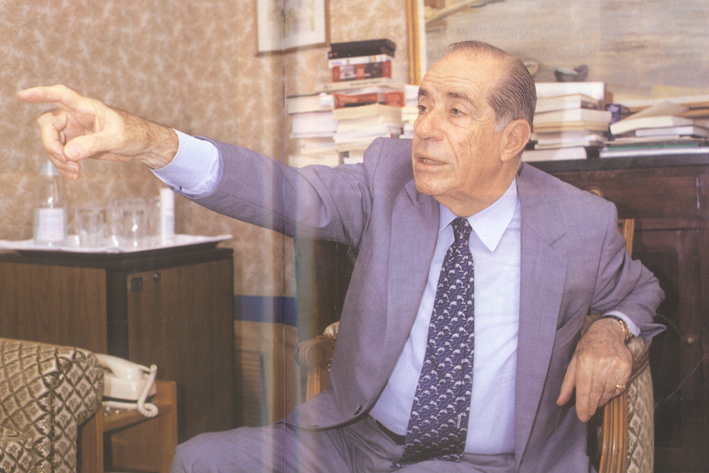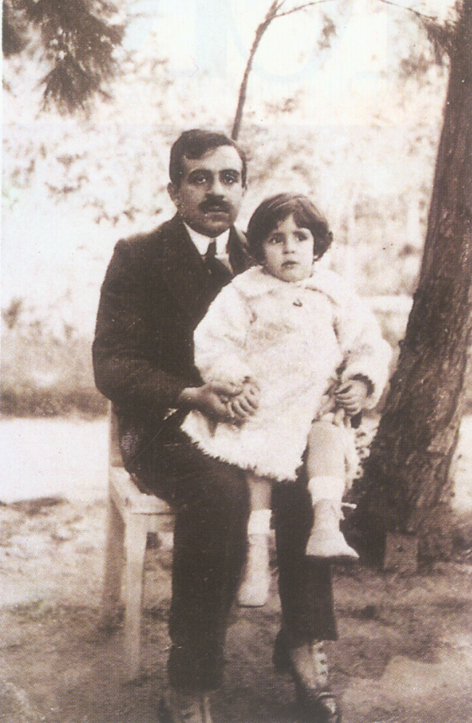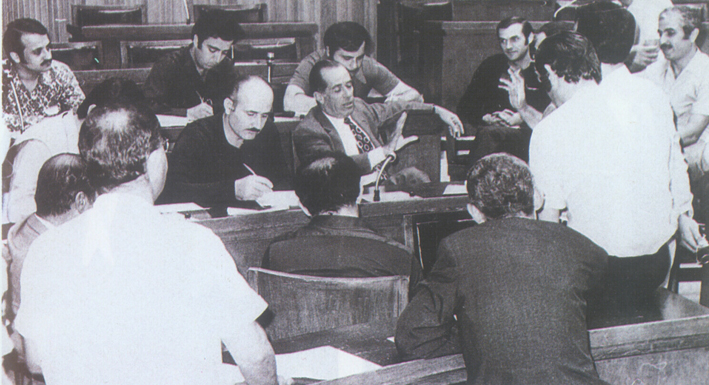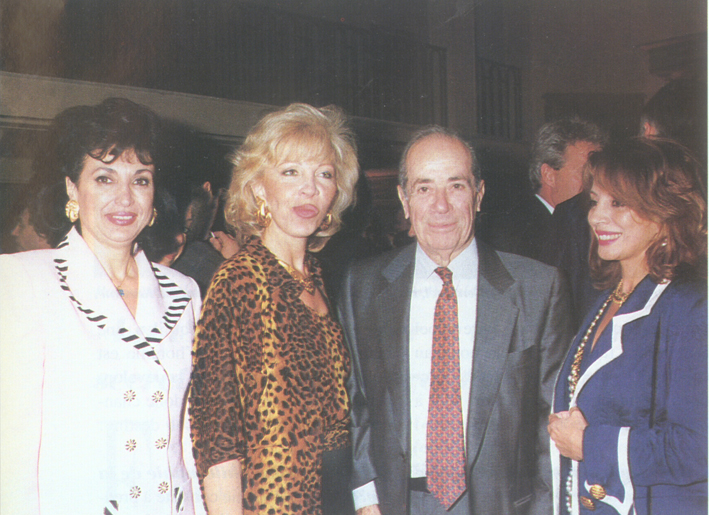Prestige issue 10, March 1994
Sporty silhouette, green eyes sparkling with mischief, with elegance and lot of humor, the Amid just turned eighty. Raymond Edde, a character out of the ordinary, with amazing presence and strength, and a surprising simplicity for someone who has the size and the authenticity of a leader of men, intelligent, full, with intact ardor.
© Tony Hage
A political odyssey that began in 1949 and was transcended by a voluntary exile.
Raymond Edde was not on a hurry to follow the path set by his father; politics did not interest the brilliant lawyer.
Born in Alexandria, on March 15th, 1913, son of Emile Edde, the first Maronite president of the Lebanese Republic, the Amid followed his secondary education at the Jesuit Fathers in Beirut and studied law at the Faculty of Huvelin street where he obtained his BA in 1934. Many times MP and minister, he is since 1949 president of the National Bloc party, founded by his father in 1943. He became a symbol of resistance to anything that could harm the country, he was the subject of several assassination attempts during his political career, including the last two attempts at monthly intervals outside his home. He tells us the self-imposed exile deliberately following the attacks. “On December 22, 1976, I received a visit from the Ambassador of Egypt who forwarded me an invitation to go to Anwar Sadat in Cairo. I agreed.
The Egyptian President asked me not to return to Lebanon, convinced there would be a new attempt against me. He showed me a list of Lebanese to eliminate. The names of Kamal Jumblatt and Raymond Edde were first, followed by several personalities that were later actually assassinated. On a mission at the Foreign Ministry by President Sadat, I arrived in Paris on January 4th, 1977 and I have been there for over seventeen years! ”
© Archives Raymond Eddé
Raymond child on the lap of his father, President Emile Edde.
Do you since that time feel less committed? I take things to heart in the same way as before; I stand with the same ardor to my ideas and points of view. My country is my main concern.
From the beginning of my political career, I decided to evaluate myself by the number of my enemies and I can assure you they are many.
How do you define yourself as a politician? Tell us about your journey. “Young, politics did not interest me, I certainly did not want to experience my father’s life who was always mobbed by a crowd of beggars who filled the house and stayed until the early hours of the morning. I wanted to enjoy my youth and what life had to offer. At that time, I was training in my quality of a lawyer in the study of my father before he was elected President of the Republic. I also continued to exercise my profession after his election, by pleading in front of mixed tribunals. I had lots of free time I devoted to hunting, which was my great passion. This allowed me to travel widely along the country, to the depths of our border towns, to know its geography and different mentalities of its inhabitants. I began my political career in 1943 during the famous parliamentary elections that decided the future of the country. I was instructed to take care of the Jbeil region we come from, specifically the village of Edde whose name we bear. At the time, there were very few roads and I did the rest of the journey on foot with Angelo, one dressed in sturdy cherwal, who carried me when the road became impassable. At that time, no one even knew me. I was the son of the former president. Here’s how I was infected with the policy, in my opinion, is the worst drugs that are difficult to heal from. In 1947, I organized the parliamentary elections in Jbeil. They were shamefully falsified. Their name “rigged elections on May 25.” My father Emile obviously failed. In 1949, he died and that is how I was elected against my will and victim of my birthright Amid of the Lebanese National Bloc. Soon after, I decided to start with Camille Chamoun, Kamal Jumblatt and a national opposition front causing widespread popular uprising and a total closure of the capital for three days, after which, the President El Khoury resigned.
It was September 18, 1952. In 1953, I was elected MP for Jbeil. In 1958, I was appointed, in the time of President Fouad Shehab, Minister of the Interior. I had several portfolios because we were only four Ministers: it was the famous “Government of Four” made up of two Sunni and two Maronites. Today, there are thirty! The government brought major reforms thanks to President Chehab; nevertheless I was forced to resign in October 1959 because I could not prevent the takeover of the second office on my ministry. I was reappointed Minister by President Charles Helou in 1968. It was also an emergency government with the same composition as the previous one (two Sunni and two Maronites). Similarly, I had several portfolios the main one being that of Public Works.
It was the year when Israeli commandos attacked Beirut airport, destroying thirteen Lebanese aircrafts. I sensed this aggression following the offensive by two Palestinian terrorists against Israeli aircraft parked at Athens airport. Tel Aviv Radio, which broadcasted the news, announced that it held the Lebanese government responsible. Anticipating an imminent attack, I warned the director of the airport, Edmond Ghosn, to immediately take the necessary measures. The next day, I communicated my concerns to the Council of Ministers and insisted to get the help of the army to protect the airport. Abdallah Al Yafi, then Prime Minister refused. The same evening, on Saturday December 1968, an Israeli army commando landed illegally near the tracks and destroyed almost all of our commercial fleet. ”
Fortunately, I had taken civil measures that were within my competence. Thus, staff and travelers have not been attained. Following the attack, I resigned from the government on January 9th 1969, because it refused to adopt my proposal to ask the Security Council to send UN forces on the Lebanese-Israeli border, in order to prevent new attacks and enforce the Armistice Agreement. These forces finally sent ten years later, after the Israeli invasion of March 15, 1978, are now ineffective. ”
© Archives Raymond Eddé
Parliamentary session to vote a law.
«In 1956, I had passed the law establishing the banking secrecy in favor of depositors»
A fair and brave fight for freedoms characterized you as a politician. As a legislator, you have a number of proposals of laws that have been adopted for most. Tell us the vote of these laws you have achieved.
«Indeed in 1953, I submitted to President Camille Chamoun, with my friend Mohsen Slim, a draft decree-law on illicit enrichment of public employees and people receiving public trust, such as presidents of the republic, council, ministers and MPs. Legislative Decree No. 38 of February 18th 1953, which was adopted, has never been applied; which encouraged corruption at all levels of the administration and the political class. In 1954, I got the vote of the law freeing rents buildings that possess the elevator, central heating and a concierge. This law led to the construction of thousands of buildings. There were only five buildings across Beirut, who enjoyed all three. Then in 1956, it was the law establishing the “absolute secrecy” in favor of bank customers. In 1959, Parliament endorsed my draft law abolishing the mitigating circumstances in cases of willful homicide, exonerating however being maintained. Was also voted the law suspending the tax on agricultural income for five years and which is renewed since. In 1961, the law instituting the “joint account” complementary to “banking secrecy” that includes legally inheriting bank accounts without paying taxes and no inheritance tax. In 1971, it was the law allowing an accused to have the assistance of counsel before the judge of military tribunal. In 1972 was passed the law on the requisition of the army for the maintenance of internal order, that fixes the case of requisitions and prohibits the intervention of the military in the electoral process; Finally, in 1974, the law making the civil court only competent in press offense and removing preventive detention.»
© Archives Raymond Eddé
Raymond Edde surrounded by Kamal Jumblatt and Rashid Karami.
You presented your candidacy for President of the Republic more than once. The first was in which year? Would you be candidate for the next elections?
“The first time was in 1958. I was the only one who dared present my candidacy for President of the Republic against General Fouad Chehab, who was at that time commander of the Lebanese army. I felt it was necessary to take the military away from politics. I managed to ballot the general who was not elected until the second round. This did not stop him after the failure of his first government to call me to be part of a new cabinet. Since then, at each presidential election, my party insisted that I apply. ”
Do what you want but do it with passion, is this the key to success? “In my personal experience, you can be educated, serious and passionate without being able to reach so far your purpose. In life, there is a significant percentage of luck: I estimate it to a minimum of 80%. I believe in fate, luck and bad luck. ”
So according to you, we cannot be the architects of our destiny? “We can improve our lives. Plato said: «The man is intelligent because he has a hand.” At birth, man is endowed with intelligence, he can develop it any time. He may therefore change partly his destiny.»
What is your philosophy of life? «My philosophy is to take life as it is, even if it is not rosy every day.»
In the era of the nuclear bomb, Pollution, AIDS, stress and the computer, everyone sees the world with his eyes through his emotions, how do you see it? «All these facts are beyond us. I think that AIDS is an injustice. Priests and religious men said that this plague would end the rampant debauchery and consolidate the bonds of marriage.»
As for the nuclear bomb, it is the product of human intelligence; in this context, we can only be in admiration. As for violence it has always existed.
Stress, widespread phenomenon, is the result of our civilization.»
Let us keep away political concerns. Tell us about your childhood, your relationship with your parents, your memories and your longings. (The Amid rises, opens a drawer and takes out the picture of a big man, seated, holding in his lap a beautiful little boy of three years). “This is my father.” (He shows me two photos). “This is my mother and my sister here who was killed during the war.
During my childhood in Alexandria, I grew up between my parents, my grandmother and my maternal aunts. We lived in a nice house with a large garden. One day, I wanted to know what was behind the wall adjoining the garden. I climbed; there I met my first love. Her name was Makboula. I was seven. She was a small Bedouin of my age. I spent part of the afternoon playing with her and other small Bedouins among dogs, donkeys and sheep. They looked after me and when I got home, I demanded to wear a guelabiya like them. Although I was severely reprimanded, that did not stop me from returning several times to my friends. As for my parents, our relations were excellent. I loved my mother and I had a great admiration for my father. ”
Are you superstitious? Do you have a lucky number? “No, I’m not superstitious, but after meeting coincidentally with a gypsy in Antibes who saw in the coffee grounds that eleven was my lucky number, I was obliged to believe since I missed the last two attacks that took place a November 11 and December 11. I also found that the addition of the letters of my name and my first name was eleven, etc … She also told me to be wary of men and to only trust women; which proved to be correct »
Do you rely on your intelligence or your gut? «My intuition»
Because you always beware of reason that might limit your universe? May be
What do you like? «I love nature, freedom, I have the sense of honor and dignity. I hate lies.»
And love in all this? Are you at that moment a free heart? (Laughs). «All I can say is that I’m not a misogynist.»
Love is a gypsy child, it has never known any law … “sings Carmen. What do you think, Amid? «True love knows no law.
This is the most beautiful creation of God! »
Love emerges like a dream. Even if we have been in love, it’s always like the first time. How many times have you been in love?
(He counts on his fingers) «Seven times!».
Have you ever really lived a passionate love? «The first time I was in love, I was just seventeen years old then and I was convinced that we could die of love. When I thought of her, my heart was beating so hard I thought getting a heart disease. It was only the second time that I discovered that we really died of love in the songs.»
Socrates stated that “loving helped to make beautiful speeches.” How do you love, Amid? Silence …
He confides: «My mother is the only woman who really counted in my life»
© Tony Hage
The Amid well surrounded by Aida Franjieh, Jinane Mahmassani and Viviane Ghanem.
Amid, could you entrust to us what kind of woman made one day or another your heart beat?
«There is no specific genre. Every woman is unique, each evokes in me quite different emotions. You know, I’m an old bachelor who has seen in his life.»
What do you look at first in a woman and what are the qualities that attract you and flaws that make you run away? «I look at her eyes first and then her hands. As qualities, she must be friendly and charming. As for flaws, I do not tolerate vulgarity or stupidity.»
Has there been one woman or more who have really mattered in your life? «My mother only.»
Why didn’t you get married? This is surprising given the tremendous success you have with women. «Me??? It is you who say it. In fact, I thank God for staying single because the pace of life that was imposed on me would have had a negative impact on a possible union, which would inevitably lead to a separation, (He continues laughing). Also, not being able to guarantee loyalty for a lifetime, I do not want to do one more victim.»
Amid the dream that is closest to your heart? «My dream is to free Lebanon from all its occupants!»
Did you realize all your dreams? Amid answers tersely, «No». In addition, he pays tribute to four Lebanese who were conspicuous by their knowledge and expertise in this host country that is France. He cites first Amin Maalouf, the Lebanese writer who challenged the greatest obtaining the most prestigious literary awards merit: the Goncourt. Similarly, he paid tribute to Professor Ara Hovannessian of Lebanese origin who has just discovered «a new key» conditioning the entry of the AIDS virus in the cells; a first and a great hope to head off this scourge; Finally, two other Lebanese who deserve our respect and who have distinguished themselves by their knowledge and expertise in contributing to the execution of one of the largest exhibition centers in Paris: the Carrousel du Louvre. Rita Anis Raad, a native of Edde, in the caza of Jbeil, a young engineer in charge of the study and then implementation of telecommunications, and the architect Philippe Rabbat, primarily responsible for the execution of this major project. » Interview by NADIA BASSOUS










